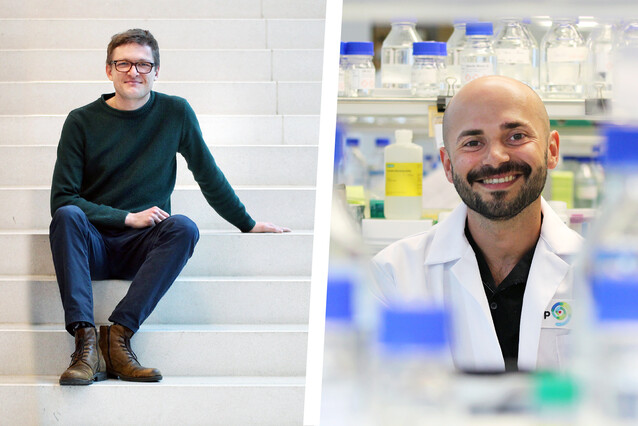Vienna BioCenter PhD Awards 2024
At this year’s Vienna BioCenter PhD Symposium, four PhD students or recent graduates were honoured for their exceptional doctoral research, spanning fields from structural biology to organoid modelling and functional genomics. With Filip Nemcko (Stark lab) and Julian Ehrmann (Clausen lab) among the laureates, two of the four awards went to the IMP.
The annual Vienna BioCenter PhD Awards recognise the most impactful doctoral theses defended that year within the respective programme. As every year, the award ceremony was embedded into the Vienna BioCenter PhD Symposium, an event organised by the students to bring together life scientists from around the world. This year, four students received the award, including two graduates from the IMP.
Filip Nemcko, recent PhD graduate from the lab of Alexander Starkat the IMP, co-developed ORFtag–a new method that simplifies the study of protein functions through mass tagging and tracking across the entire genome. By harnessing a retrovirus, ORFtag inserts DNA tags directly into the genome, allowing researchers to attach small markers to proteins as they are produced. This new method enables scientists to explore protein functions in various biological contexts, such as identifying proteins that regulate gene expression.
The development of ORFtag is the result of a collaborative effort of Vienna BioCenter scientists from the IMP, the Institute of Molecular Biotechnology (IMBA), and the Max Perutz Labs, and was published in the journal Nature Methods this July.
“I think this project really shows what the Vienna BioCenter is all about. The success we had come from the diverse skills and perspectives from the different institutes working together, proving how powerful collaboration can be in science.”
Julian Ehrmann, from the lab of Tim Clausen at the IMP, worked to reveal the structure and function of BIRC6, a large enzyme crucial for regulating apoptotic cell death and inhibiting autophagy. Using cryogenic electron microscopy (cryo-EM), he demonstrated how BIRC6 selectively targets and ubiquitinates specific proteins by “embracing” them within a central cavity, causing their degradation. He also found that a stress-induced inhibitor, SMAC, can occupy this same cavity, effectively blocking BIRC6’s activity by preventing it from binding to its typical targets.
This discovery was published in the journal Sciencelast February, and Julian is now a postdoc at Boston Children’s Hospital and Harvard Medical School in the lab of Hao Wu, where he is investigating multi-protein complexes in inflammatory pathways.
“I look back very fondly at my time at the IMP; the constant exchange of ideas, quality of facilities, frequent seminars by field leaders, and the campus-wide willingness to collaborate and enthusiastically engage with one’s research,” he says.
The other two recipients of the award were Laura Santini from the lab of Martin Leeb at the Max Perutz Labs, and Alison Deyett from the lab of Sasha Mendjan at IMBA.
Further reading
The Vienna BioCenter PhD Program
